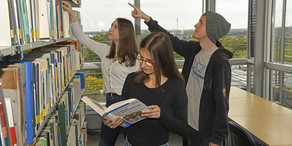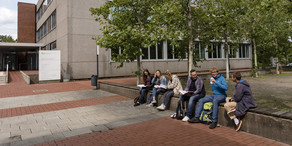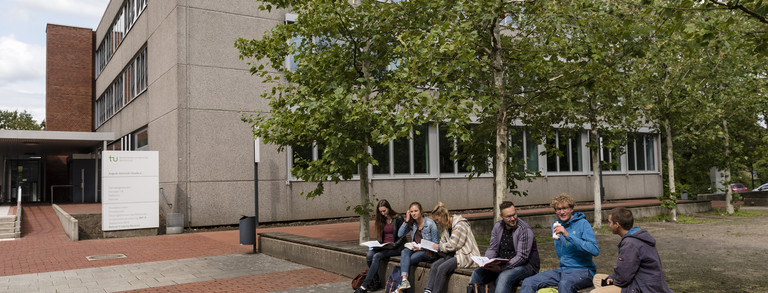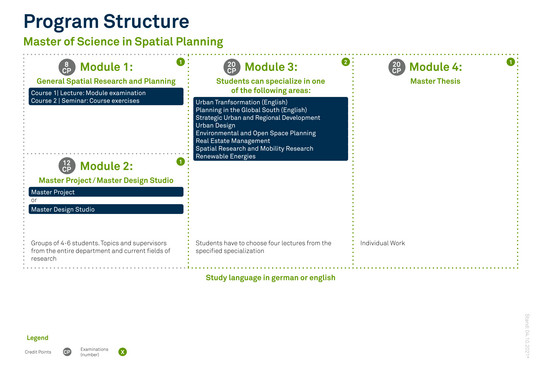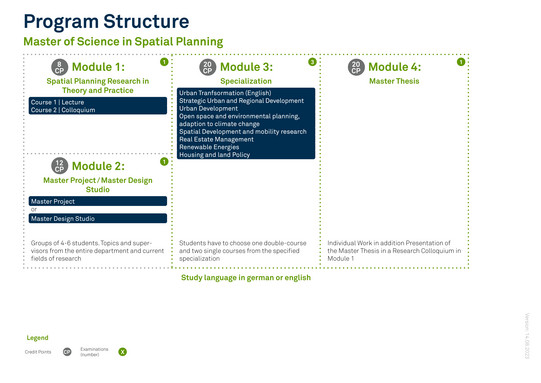Program Structure & Content
The standard period of study for the Master's degree in Spatial Planning is two semesters. In order to graduate with the academic degree "Master of Science", a total of 60 credit points (LP) must be acquired in the following four modules:
- Module 1: Spatial Planning Research in Theory and Practice (8 CP)
- Module 2: Master Project / Master Design Studio (12 CP)
- Module 3: Specialization (20 CP)
- Module 4: Master Thesis (20 CP)
The course of studies can be designed individually, since no formal participation requirements are set for any module.
Modules
Module 1 offers students orientation at the beginning of their studies, a scientific-critical examination in the field of research activities of the department and, furthermore expands the knowledge of advanced working and research methods in spatial planning. The module leads towards an occupation in spatial and planning research. Students who have not completed the bachelor's degree program in spatial planning at the TU Dortmund University will also gain an insight into the content of current research on structural change and spatial development.
Module 1 consists oft wo elements, which focus on on-depth knowledge of current research in the fields of spatial planning, general research practice, epistemology and methodological research. Element 1 is a lecture, which includes an overview of current projects, topics, and issues in spatial planning research both, domestically and internationally. This covers an examination of the research landscape (funding institutions, research facilities, career paths), basics of submitting applications, good scientific practice, and the exemplary presentation of current research projects. In addition, knowledge of scientific policy advice is imparted.
Element 2 consists of colloquia with a seminar character, in which ongoing master theses are presented and discussed. In addition, thematic and methodological issues of spatial science research are also covered.
In Module 2 students can choose between a project or design work, which is carried out independently in small groups of usually 4 - 6 students and is supervised by teachers of the department. The topics are based on current research fields of the department. Students learn to work on complex spatial problems in a cooperative manner using scientific methods within a given time frame and to demonstrate possible solutions.
In the Master's project, the focus is on the theoretical-analytical or planning-conceptual processing of a current issue in spatial research and planning. In the master's design element, the focus is on spatial-conceptual planning at different scales. The core of the element is a practical design assignment that addresses current issues.
The module is completed in one semester with a total of 12 CP. The development of project and design work enables students to profile themselves more strongly in terms of content. As a rule, several groups are supervised by one teacher and the progress of the work is discussed at regular joint meetings.
The conclusion of the one-semester work is either a written final report with a disputation or the preparation of a draft with an explanatory report and disputation. In consultation with the lecturers, a further deepening of the topic or an aspect in the Master's thesis is also possible.
Module 3 (specialization) offers students a choice of courses in eight possible specializations to deepen their individual knowledge. Advanced knowledge is imparted on central topics and challenges of urban and spatial planning. They learn how to deal intensively with the current state of research and how to elaborate it with professors or postdocs. One double seminar (4 SWS) and two single seminars (2 SWS each) have to be chosen. A double seminar has a common point of reference and is usually offered by two lecturers from different disciplines. All lectures prepare students for the preparation of the Master's thesis due to their close reference to current topics of spatial research and planning.
We offer the following specializations:
- Strategic Urban and Regional Development
- Urban Planning
- Landscape Ecology and Landscape Planning, climate adaptation
- Spatial and mobility research
- Housing and Land Policy
- Real Estate Management (only German)
- Renewable Energies (only German)
- Urban Transformation
Students are free to choose whether to study one of the specializations listed or to obtain a master's degree in spatial planning without a specialization listed on the transcript.
More Information about the specializations is listed here:
The Master's thesis (20 LP) is a scientific paper in the field of spatial planning. The thesis can have a theoretical, empirical or conceptual-designed focus.
The thesis should show that the students are able to work independently on a complex spatial planning issue according to scientific standards and methods.
The thesis is written within four months after registration and should not exceed 175,000 characters. During the completion of the master's thesis, students present the status of their work in a research colloquium in module 1.
Course of studies and prerequisites
For further information on the course of studies and the prerequisites, please refer to the graphic on the study structure or the PDF file with the information on the course of studies and the calculation of credits & accreditation. Information on the course content, competencies and the form of examination can be found in the current module handbook and in the examination regulations.
The current event, project and seminar topics and descriptions can be viewed in the LSF. Even without a login, these can be viewed under Events > Course Catalog > Spatial Planning.





